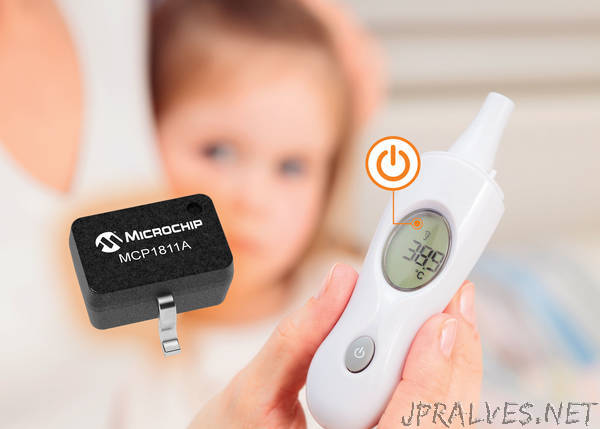
“Device prolongs battery life up to four times longer than traditional ultra-low Iq LDOs
Portable electronic devices are now expected to run for months or even years on a single battery, making minimizing power consumption in these applications a top priority for product designers. Microchip Technology Inc. (Nasdaq: MCHP) today introduced a linear Low Dropout (LDO) regulator that extends battery life in portable devices up to four times longer than traditional ultra-low quiescent (Iq) LDOs. With an ultra-low Iq of 250 nanoamps (nA) versus the approximately 1 uA operation of traditional devices, the MCP1811 LDO reduces quiescent current to save battery life, enabling end users to recharge or replace batteries less often.
Ideal for IoT and battery-operated applications such as wearables, remotes and hearing aids, the 250 nA ultra-low Iq reduces power consumption in applications by minimizing standby or shutdown current. Reducing standby power consumption is critical in remote, battery-powered sensor nodes, where battery replacement is difficult and operating life requirements are high. Available in package options as small as 1 x 1 millimeter (mm), the MCP1811 consumes minimal board space to meet the needs of today’s compact portable electronic designs. Depending on the application and number of LDOs, designers can take advantage of the extra board space with a larger battery to further increase battery life.
“Microchip continues to invest in bringing innovative power management devices to market that enable designers to extend battery life in applications,” said Rich Simoncic, vice president of Microchip’s Analog, Power and Interface business unit. “As the prevalence of small battery-powered devices continues to grow, the MCP1811 LDO offers developers a way to increase efficiency in applications without compromising on board space.”
An additional benefit the MCP1811 offers is faster load line and transient response when compared to other ultra-low Iq LDOs. Faster response times can accelerate wake-up speed in devices such as monitors or sensors that require immediate attention. Faster transient response can help designers avoid undervoltage and overvoltage lockout measures used in sensitive applications where transient spikes can lead to catastrophic results.”
